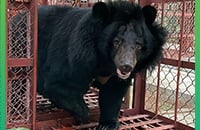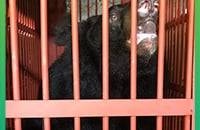Row prompts fresh calls for animal welfare laws in Vietnam
27 May 2015

As animal cruelty in Vietnam once again makes international headlines, Animals Asia has stressed the need for robust animal welfare legislation.
Reports appearing to confirm that Australian cattle exported to Vietnam are being slaughtered by sledgehammer has caused outrage and led to calls for suspension of live exports to the country.
The Australian government is said to be investigating the allegations of mistreatment but remains reluctant to suspend exports as Vietnam is the second largest importer of Australian live cattle.
However with Vietnam’s National assembly currently meeting in Hanoi and with animal welfare legislation in the pipeline – there remains an urgency for enforceable legislation.
Animals Asia Vietnam Director Tuan Bendixsen said:
"The rights of animals is one of the hottest topics in Vietnam right now and the country deserves great credit for hosting such a well-informed debate in its media. We are seeing a huge upsurge, especially amongst the young, in interest in animal welfare and the demand for change.
“However, Vietnam continues to make international headlines with instances of animal cruelty such as this. Until there are robust animal welfare laws in place this will continue to be the case. Right now Vietnam's National Assembly is meeting and drafting animal welfare legislation. It has the power to end this kind of cruelty. It must take the opportunity."
Animals Asia Animal Welfare Director Dave Neale added:
"Vietnam is a member of the World Organisation for Animal Health and has signed up to an agreement to implement humane slaughter. With that in mind Vietnamese authorities need to be investigating this footage. Those following this from overseas should also be reminded of the very existence of slaughterhouses. This may be a horrific extreme but we should all remember that there is no such thing as cruelty-free meat. Animal welfare charities will continue to pressure authorities for change. If individuals want to see an end to this kind of cruelty it is also worth considering making their own life changes and contemplating vegetarianism or, at least, cutting down the amount of meat they eat."
BACK




 Freedom after two decades: Moon bears Nang and Mua rescued
Freedom after two decades: Moon bears Nang and Mua rescued
 With heavy hearts we say goodbye to our beloved Tulip
With heavy hearts we say goodbye to our beloved Tulip
 Three moon bears rescued from notorious bear bile farming hotspots in Vietnam
Three moon bears rescued from notorious bear bile farming hotspots in Vietnam